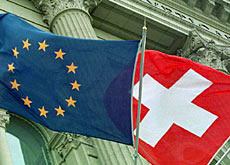Banks are prepared for savings tax

A laboriously negotiated treaty on savings tax between Switzerland and the European Union comes into force on July 1.
The accord, part of a second set of bilateral treaties, leaves Swiss banking secrecy intact.
“For the first time in its history Switzerland will collect taxpayers’ money for other states,” Thomas Sutter, spokesman for the Swiss Bankers Association, told swissinfo. “For the banks, that comes with a considerable bill.
“Banks have had to adapt their IT systems and write to their customers outside the EU.”
Industry representatives put the cost to banks at SFr100-SFr300 million ($78-$234 million).
The EU is hoping to boost its tax take substantially with the new agreement, but it is not yet clear how much the union will actually receive.
The accord specifies that savings interest earned by EU residents’ accounts in Switzerland will be taxed here, and the money transferred to their country of residence.
Withholding tax
To avoid this, customers can voluntarily declare their interest earnings wherever they are resident for tax purposes.
In cases where customers do not want to do this explicitly, Swiss financial institutions will levy a withholding tax on the interest earnings and deliver this to the appropriate country.
The amount withheld will be 15 per cent initially and this will increase to 35 per cent in 2011. Three-quarters of the take goes to the EU countries concerned, while the balance is shared between the Swis federal government and the cantons.
The withholding tax will be levied only on individuals’ assets (not companies’), and will apply only to savings interest (not dividends), new bonds (issued after March 2001) and payments from countries which are part of the agreement.
Loopholes
The percentage taxed may seem substantial, but is in fact fairly modest, particularly with interest rates so low. Nevertheless, there are some concerns that investors will move money out of Switzerland.
“We can’t predict customers’ behaviour,” says Veronique Humbert from the Swiss Federal Tax Administration. “There’s nothing stopping them from moving their accounts to Singapore.”
However, the cost of transferring money is likely to be a deterrent – in many cases it is higher than the 15 per cent tax deduction.
Analysts point out that there are plenty of ways of avoiding the tax, such as moving investments into old bonds and shares. Some property developers point out that the cost of old bonds has gone up.
There are also more complex ways of avoiding the tax, for example, by setting up holding companies which are exempt.
At present no one will – or can – estimate the total revenues that the EU can expect from the savings tax accord.
According to statisticians at the Swiss National Bank, the income subject to this tax for 2003 ought to be SFr2-SFr3 billion – estimated generously. With a tax rate of 15 per cent, that would result in tax returns of SFr300-SFr450 million.
Banking secrecy
The savings tax accord is the result of years of often tough negotiations between Switzerland and the EU.
A sticking point for a long time was the EU’s demand that Bern lift banking secrecy in cases of tax evasion. Eventually a compromise was reached with the withholding tax.
“Swiss banking secrecy for customers remains absolutely untouched,” said Sutter. “That was our principal condition.”
Only in cases of tax fraud (the falsification of documents and signatures) will banking secrecy be wavered.
In December 2004 the Swiss parliament passed the second set of bilateral agreements, known as Bilaterals II, which includes the savings tax accord.
swissinfo, Andreas Keiser
The savings tax accord is the third of nine accords in the second set of bilateral treaties between Switzerland and the EU.
The accord on processed agricultural products has been in force since March 30.
The treaty concerning pensions for former EU officials followed on May 31, but it won’t apply until 2006.
Austria, Luxembourg and Belgium are also introducing a withholding tax instead of an automatic information exchange. The three EU member states thereby preserve banking secrecy.

In compliance with the JTI standards
More: SWI swissinfo.ch certified by the Journalism Trust Initiative



You can find an overview of ongoing debates with our journalists here. Please join us!
If you want to start a conversation about a topic raised in this article or want to report factual errors, email us at english@swissinfo.ch.